Connecting Foodways (Wolf, Simone)
Cultural Entanglement and Technological Transmission between the Middle Nile valley and central and eastern Africa during the Early Iron Age
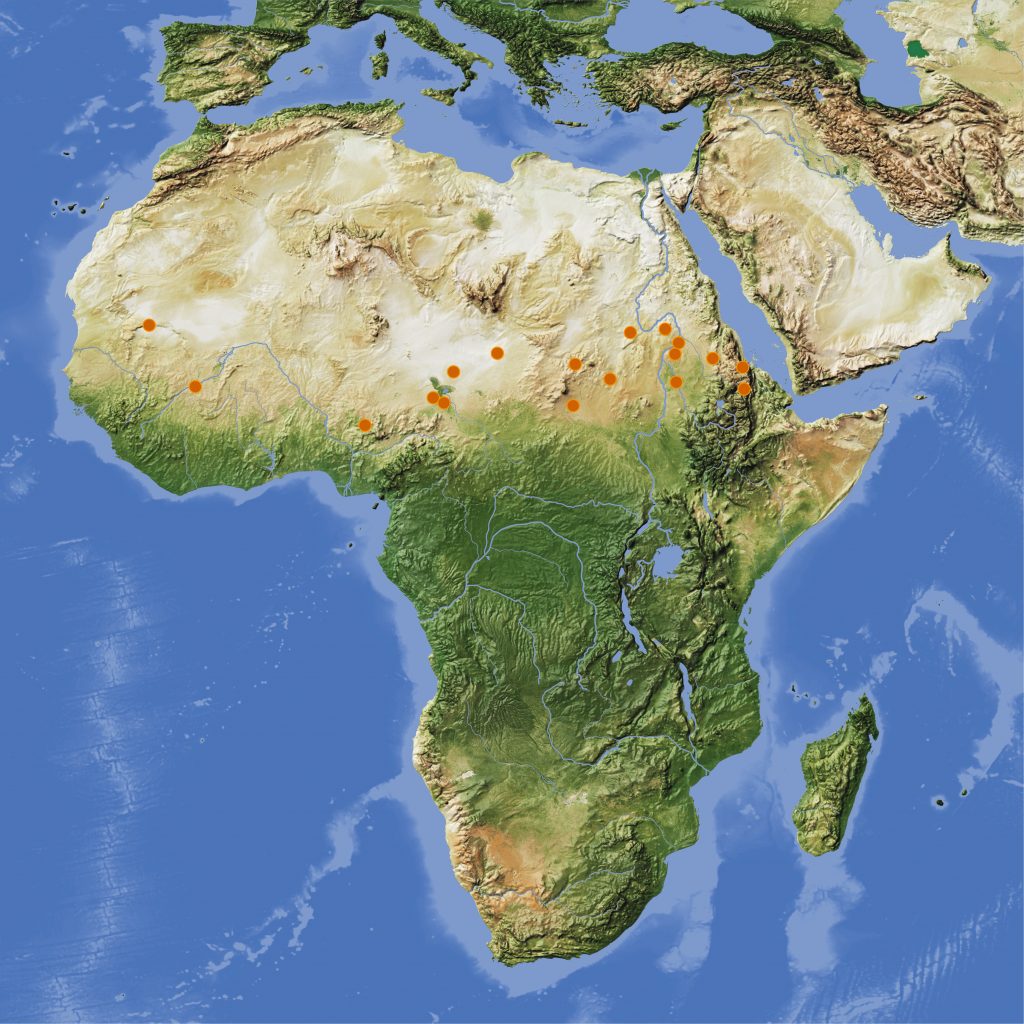
Michael Schmeling, licensed under CC BY 4.0 international, waterbodies © OpenStreetMap contributers, modification by Johanna Sigl
Project description
The focus of the Connecting Foodways project is the exploration of everyday ancient culinary traditions across sub-Saharan northern Africa. As part of the Entangled Africa program, we use the archaeological evidence of these vibrant and diverse food traditions to investigate inter-regional interaction and cultural transmission across West and northern East Africa during the early Iron Age (c. 1000 BC – AD 1000).
Our approach to studying inter-regional interaction and transmission places emphases on people-centred activities, and in particular the role of domestic and household traditions, economies and learning, in long-term perspective. This differs significantly from traditional approaches to inter-regional interaction, which typically focuses on elite emulation and formal interaction, such as through the study of trade and exchange, prestige goods and styles.
The focus of the Connecting Foodways project is upon the study of food preparation areas or ‘kitchens’, and humble, handmade cooking pots, and the cultural life of the people who used them. Analysis of these provides an analytical basis for delineating culinary traditions and cultural connections on the basis of the remains of day-to-day cooking practices.
Here we compare changing occurrences in functional-based traits between regional culinary traditions. The material culture of these traditions is comprised of two main analytical components: 1) food technologies, being primarily ceramic vessels used for storage, cooking, and consumption, as well as cooking installations, such as ovens, and 2) food stuffs, comprising botanical remains, like charred seeds, and food residues recovered on pottery vessels.
During phase 1 (2019-2022) of the Connecting Foodways project, our research activities concerned the study of ancient food traditions found in northern East Africa. Here the focus was upon the kitchens and houses from settlement sites recently excavated along the Middle Nile Valley in Sudan, including the Meroitic town of Hamadab, and from Tigray, northern Ethiopia, such as the pre-Aksumite village of Ziban Adi. These provided important detailed case studies for everyday foodways for people who lived as part of the kingdoms of Kush and Diamat. Further investigations included the food traditions of the people who lived beyond these central areas. For example, areas in Eastern Sudan, along the Gash delta and Blue Nile, and in Western Sudan in Darfur and Kordofan, identified as being regions of significant cultural transmission.
Study of the kitchen contexts and cooking pots from northern East Africa provided the basis for both regional and intra-regional comparisons of food technologies and foodstuffs. The degree of variation recorded within these, based on morphological, materials, and residue analysis, provided a means for defining specific cooking-sets comprised of a limited range of functional forms. Moreover, certain culinary traits were identified as significant marker-types for the study of wider inter-regional interaction and cultural transmission, having supra-regional distributions. These include traits such as 1) globular cooking vessels, 2) ceramic griddle plates, and exterior pottery treatments, like 3) mat-impressed surfaces.
Phase 2 (2022-2025) of the Connecting Foodways project utilises these marker-types for investigating similarly important regions of cultural transmission across north Central and West Africa, focussing on a number of case studies from central Chad, the Lake Chad region, central Nigeria, the Inner Niger Delta in Mali, and southeast Mauritania. Here the emphasis remains upon the study of handmade cooking pots from domestic contexts, as well as the use of different regional crops preferences in the production of meals. The relationship between the everyday food traditions of people living within early Iron Age complex societies, such as the Nok and Gajiganna archaeological cultures, and those living beyond or outside such entities remains a central focus of study in our analysis of cultural interaction.
As part of the Entangled Africa program, the Connecting Foodways project has been instrumental in developing collaborative research with a number of partner projects and related missions and institutions. Our study area, ranging from the Atlantic to the Red Sea, provides an important bridge between more regionally focussed projects across West and northern East Africa. The emphasis on social and cultural foodways also compliments natural science projects focussed on environmental aspects of African food-histories, with common interests in data production, analysis, and management strategies. The project is therefore well integrated into the wider research network of the Entangled Africa program, and we gratefully acknowledge the generous support of our many collaborative partners without which this project would not be possible.
Project members

Applicant/Project director
German Archaeological Institute / Headquarters Berlin
simone.wolf@dainst.de
Dr. Ulrike Nowotnick
Research fellow/Administration
German Archaeological Institute / Headquarters Berlin
ulrike.nowotnick@dainst.de
Co-director
German Archaeological Institute / Oriental department
pawel.wolf@dainst.de
Link:
https://www.dainst.org/projekt/-/project-display/59338
Research fellow
German Archaeological Institute / Headquarters Berlin
steven.matthews@dainst.de
Link:
https://rug.academia.edu/StevenMatthews
Posts

Report on SPP Entangled Africa Annual Meeting in Münster
Allgemein EN, P01 Prehistoric Axes EN, P02 Connecting Foodways EN, P03 InterLINK EN, P04 Lake Chad EN, P05 Landscapes EN, P06 DeGreening EN, P07 Routes of Interaction EN, P08 ClimCellMed EN, P09 Borrowed words EN, P10 Congo Basin EN, P11 FDM EN, P12 Coordination, P13 Tracing Connections EN![[Attribution: unknown; Copyright: not defined] D-DAI-KAAK-2024-JS-0063-PlanetAfrica_Eroeffnung_BER](https://www.dainst.blog/entangled-africa/wp-content/uploads/sites/11/2024/12/D-DAI-KAAK-2024-JS-0063-PlanetAfrica_Eroeffnung_BER-scaled-e1734001679313-247x163.jpg)
“Planet Africa” in the James Simon Gallery: Exhibition Opening and Press Reviews
Allgemein EN, P01 Prehistoric Axes EN, P02 Connecting Foodways EN, P03 InterLINK EN, P04 Lake Chad EN, P05 Landscapes EN, P06 DeGreening EN, P07 Routes of Interaction EN, P08 ClimCellMed EN, P09 Borrowed words EN, P10 Congo Basin EN, P11 FDM EN, P12 Coordination, P13 Tracing Connections EN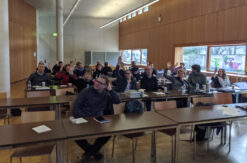
SPP Annual Meeting 2024 in Cologne
Allgemein EN, P01 Prehistoric Axes EN, P02 Connecting Foodways EN, P03 InterLINK EN, P04 Lake Chad EN, P05 Landscapes EN, P06 DeGreening EN, P07 Routes of Interaction EN, P08 ClimCellMed EN, P09 Borrowed words EN, P10 Congo Basin EN, P11 FDM EN, P12 Coordination, P13 Tracing Connections EN![[Attribution: ; Copyright: ] KAAK-SPP2143-TN-2023_Jahrestagung_Frankfurt_01-2022-8](https://www.dainst.blog/entangled-africa/wp-content/uploads/sites/11/2023/01/KAAK-SPP2143-TN-2023_Jahrestagung_Frankfurt_01-2022-8-247x163.jpg)
SPP Annual Meeting at the Goethe-University Frankfurt from 16th to 17th January
Allgemein EN, P01 Prehistoric Axes EN, P02 Connecting Foodways EN, P03 InterLINK EN, P04 Lake Chad EN, P05 Landscapes EN, P06 DeGreening EN, P07 Routes of Interaction EN, P08 ClimCellMed EN, P09 Borrowed words EN, P10 Congo Basin EN, P11 FDM EN, P12 Coordination, P13 Tracing Connections EN![[Attribution: J. Sigl; Copyright: Entangled Africa, KAAK] 2022-01-10_Teilnehmende07](https://www.dainst.blog/entangled-africa/wp-content/uploads/sites/11/2022/01/2022-01-10_Teilnehmende07-247x163.jpg)
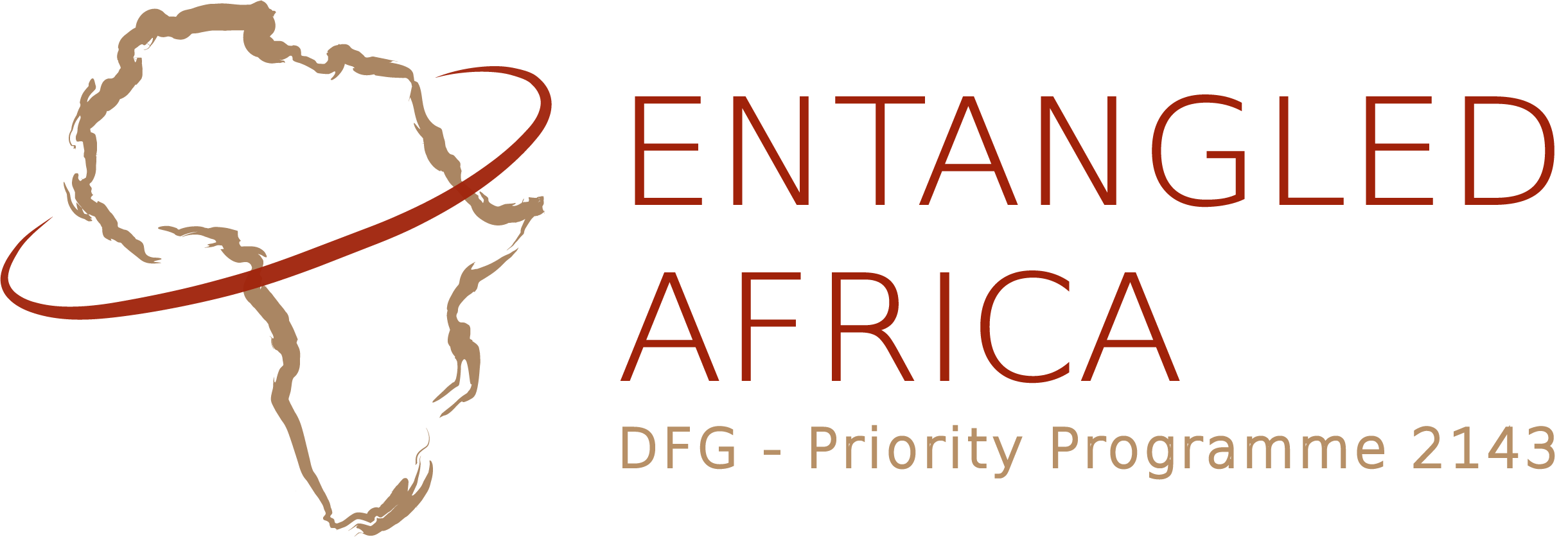
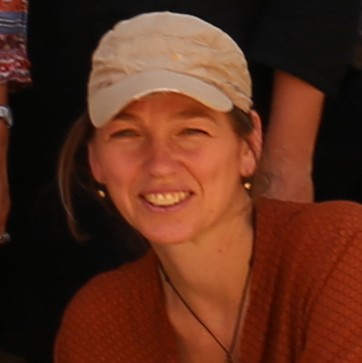
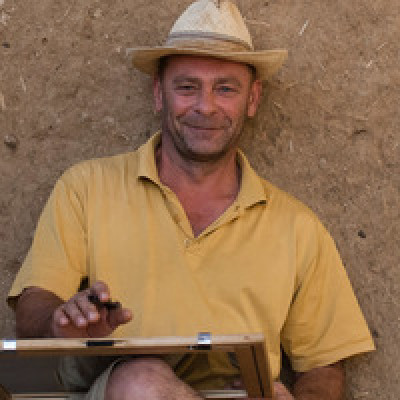

![[Attribution: unknown; Copyright: not defined] safa_logo](https://www.dainst.blog/entangled-africa/wp-content/uploads/sites/11/2023/07/safa_logo-247x163.png)
![[Attribution: ; Copyright: ] welcome_diner](https://www.dainst.blog/entangled-africa/wp-content/uploads/sites/11/2022/12/welcome_diner-247x163.jpg)
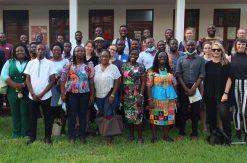
![[Attribution: unknown; Copyright: SAfA 2021] SAFA banner](https://www.dainst.blog/entangled-africa/wp-content/uploads/sites/11/2021/08/safa_banner_6_2021_von-Webseite-247x163.jpg)
![[Attribution: ; Copyright: ] Poster](https://www.dainst.blog/entangled-africa/wp-content/uploads/sites/11/2021/03/Poster-247x163.png)
![[Attribution: ; Copyright: ] Bild_1a](https://www.dainst.blog/entangled-africa/wp-content/uploads/sites/11/2020/09/Bild_1a-scaled-e1599479215658-247x163.jpg)
![[Attribution: ; Copyright: ] HVU-09-0210 (HMD 20101117_C_006).jpg](https://www.dainst.blog/entangled-africa/wp-content/uploads/sites/11/2020/07/HVU-09-0210-HMD-20101117_C_006.jpg-247x163.jpg)
![[Attribution: ; Copyright: ] CFW_PH_200215_005b](https://www.dainst.blog/entangled-africa/wp-content/uploads/sites/11/2020/06/CFW_PH_200215_005b-247x163.jpg)
![[Attribution: ; Copyright: ] Foto (1)](https://www.dainst.blog/entangled-africa/wp-content/uploads/sites/11/2020/06/Foto-1-247x163.jpg)
![[Attribution: ; Copyright: ] Figure 1](https://www.dainst.blog/entangled-africa/wp-content/uploads/sites/11/2020/04/Figure-1-247x163.jpg)
![[Attribution: ; Copyright: ] WAC_Prag_Titelbild](https://www.dainst.blog/entangled-africa/wp-content/uploads/sites/11/2020/01/WAC_Prag_Titelbild-247x163.jpg)
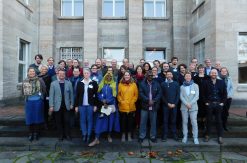
![[Attribution: ; Copyright: ] DAI_KAAK_191214_SudanTag_Berlin_JL-6-1](https://www.dainst.blog/entangled-africa/wp-content/uploads/sites/11/2019/12/DAI_KAAK_191214_SudanTag_Berlin_JL-6-1-247x163.jpg)
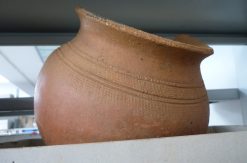
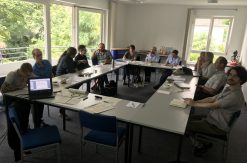
![[Attribution: unknown; Copyright: not defined] 2024-03-07_10-10](https://www.dainst.blog/entangled-africa/wp-content/uploads/sites/11/2024/03/2024-03-07_10-10-247x145.png)
![[Attribution: ; Copyright: ] Antike_Sudan_Titel](https://www.dainst.blog/entangled-africa/wp-content/uploads/sites/11/2020/12/Antike_Sudan_Titel-1-247x163.jpg)
![[Attribution: F. Jesse; Copyright: F. Jesse] JOGA_Jesse_-_Nowotnick_content_picture](https://www.dainst.blog/entangled-africa/wp-content/uploads/sites/11/2022/07/JOGA_Jesse_-_Nowotnick_content_picture-247x163.jpg)
![[Attribution: Jaarverslagen van de Vereniging voor Terpenonderzoek; Copyright: Jaarverslagen van de Vereniging voor Terpenonderzoek] matthews_2022_title](https://www.dainst.blog/entangled-africa/wp-content/uploads/sites/11/2022/07/matthews_2022_title-247x163.jpg)
![[Attribution: Reichert Verlag; Copyright: Reichert Verlag] AFA1_Nowotnick_Cover_FINAL_cut](https://www.dainst.blog/entangled-africa/wp-content/uploads/sites/11/2022/04/AFA1_Nowotnick_Cover_FINAL_cut-247x163.jpg)
![[Attribution: ; Copyright: ] DAIForschungsberichte2020](https://www.dainst.blog/entangled-africa/wp-content/uploads/sites/11/2021/03/DAIForschungsberichte2020-247x163.jpg)
![[Attribution: ; Copyright: ] AZANIA_cover_ausschnitt](https://www.dainst.blog/entangled-africa/wp-content/uploads/sites/11/2021/01/AZANIA_cover_ausschnitt-1-247x163.jpg)